Choosing the right online course platform is one of the most important things you can do to set your online learning business up for success. The best one will help you get the biggest return for your time and effort, and still allow you to enjoy what you do without becoming burnt out.
Thanks to its easy learning curve, Teachable is a common choice for instructors entering the online learning market. But is Teachable the best option out there?
Many Teachable alternatives available today offer a broad range of features for instructors and students.
Lucky for you, we’ve analyzed and rounded up 8 of the best Teachable alternatives for selling courses online.
8 Best Teachable Alternatives, At A Glance
| G2 Rating | Best For | Pricing | |
| Uscreen | 4.8 out of 5 | Video-first course creators looking to scale up their community and revenue with memberships | Starting from $149.99 per month |
| Thinkific | 4.6 out of 5 | Creators on a budget | Offers a free plan. Other plans start at $39 per month |
| Mighty Networks | 4.6 out of 5 | Creating online courses focused on community over content | Starting from $99 per month |
| Podia | 4.6 out of 5 | Creators that need an all-in-one digital storefront | Offers a free plan with transaction fees. Other plans start at $9 per month |
| Kajabi | 4.3 out of 5 | Seasoned infopreneurs | Starting from $149.99 per month |
| LearnDash | 4.2 out of 5 | Building courses on WordPress websites | Starting from $199.99 per year |
| Skillshare | 3.3 out of 5 | Creative courses | Revenue share calculated from no. of course minutes watched |
| Udemy | 2.1 out of 5 | Creators with no audience | Various revenue share options depending on acquisition |
Why Teachable Might Not Be The Right Choice For You
Teachable is a well-established name for course creators. And, with a focus on entry-level creators, they’ve helped a lot of newbies kick-start their businesses.
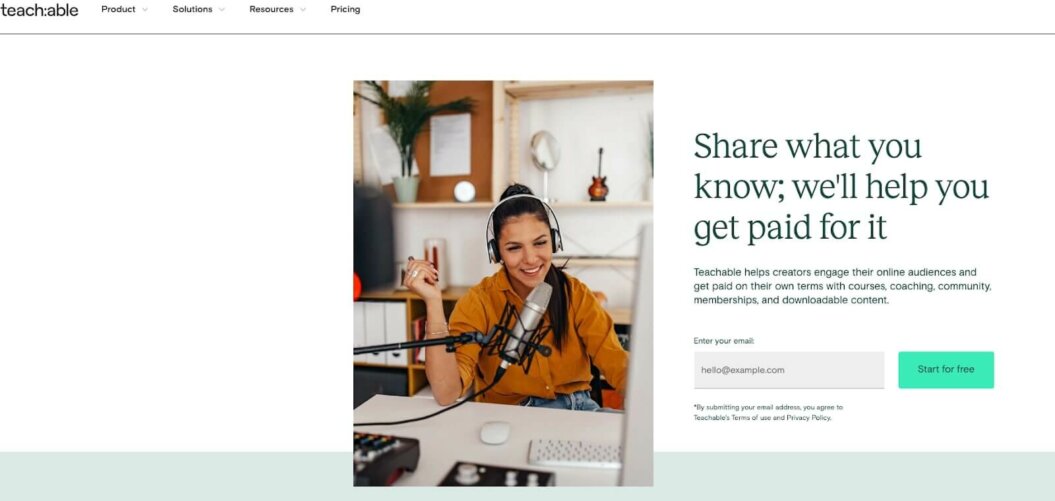
Though they definitely make it easy and accessible for new course creators, it does come with a compromise on some of the more robust features you might be looking for.
A common criticism from their customers in their G2 reviews is that they’re missing a lot of advanced functionality that lots of course platforms come with as standard, like:
- Modern-looking site themes
- Impactful analytics tracking
- Course completion certificates
There’s also a general sense that their platform is aging poorly compared to other more innovative platforms on this list like Uscreen, Kajabi, and Thinkific, with a number of bugs and usability issues.
We’ve been a customer for 6 years and have about 5 schools with Teachable. In the last year we’ve had a huge number of issues with the platform. The platform itself has gotten really buggy over the last couple years. The admin panel often takes 30 seconds or more to move from screen to screen, and sometimes simply fails to function.”
– Mark T, Verified User
I do honestly believe that, if this is your first foray into the world of online courses, Teachable has some great features to help you get started that you should explore, especially if you’re okay with needing to migrate to a different platform at a later date.
But:
If you want a more comprehensive long-term solution, you’d be better off with one of the other Teachable alternatives on this list.
How I Built This List Of Teachable Alternatives
How do you rank a list of Teachable alternatives that could appeal to so many different course creators? Simple: you use their G2 Ratings.
This is an independent score out of 5 stars based on ratings by real customers and reviewers. It’s a bit like TrustPilot or TripAdvisor but for software. This means we can remove any bias from the post!
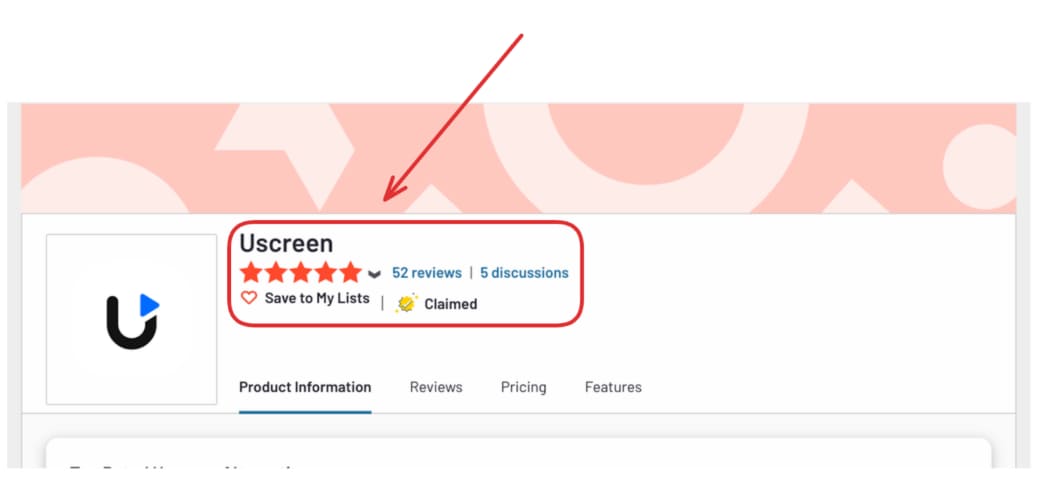
The 8 Best Teachable Alternatives For Your Online Courses, Ranked
1. Uscreen
Best for: video-first course creators looking to scale up their community and revenue with memberships.
G2 Rating: 4.8 out of 5

Uscreen is a video membership platform you can use to scale your online course business. It’s an all-in-one platform that allows you to charge students a recurring fee to access all of your educational content and your exclusive community on an ongoing basis.
Uscreen is perfect for established content creators with an audience on YouTube or Social Media. Especially if you’re looking to add value beyond your course videos, by adding community spaces and interactive content like live streams.
With Uscreen, you can build an entire video library of online courses, with a thriving community on your own branded membership site. And, you can go even further by adding mobile and TV apps. This makes it one of the best Teachable alternatives on the market right now!
Now, you might be thinking:
Why is a “membership platform” at the top of a list of Teachable alternatives? Shouldn’t it, you know…be an online course platform?
Well, you’d be surprised at how many course creators and online coaches are benefitting from expanding beyond traditional courses into membership sites with active communities.
We have a full breakdown of that on our YouTube channel right here:
But you can also read how AdjusterTV transformed their business by adopting this new approach to online courses below.
409% Revenue Growth: How AdjusterTV Plus Found Success With Uscreen
AdjusterTV Plus is a great example of how you can use Uscreen’s membership platform to take your online course business to new levels of profit and reliability.
Founded by insurance claims adjuster, Matt Allen, AdjusterTV launched as a YouTube channel and ventured into online education through eBooks and hosted online courses.

Looking to bring all of his offerings onto his own branded site he partnered with Uscreen to build a hybrid model of individual courses and membership access.
Engagement and retention were a key focus for Matt, and content organization played a crucial role in keeping people coming back for more.
Matt leveraged Uscreen’s category and collection capabilities to create guided tutorials, offering a step-by-step process that was easy for users to follow along with.
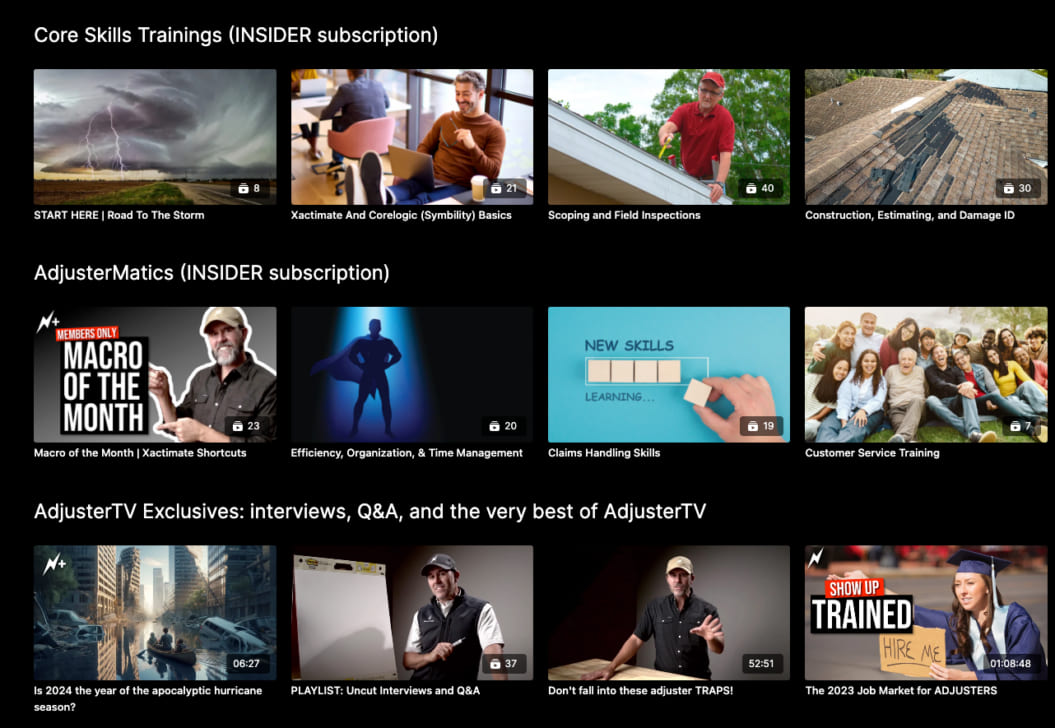
And, the results speak for themselves. AdjusterTV Plus has grown to over $16k/month, marking a 409% increase over the last 12 months. This success has allowed Matt and his wife to run the platform full-time!
What Customers Say
“Uscreen’s platform is very user-friendly to design your online course. I have never created an online course platform before, but I was able to quickly learn the functions of the platform and launch our Crawford Vision Training quickly!”
Geoffrey C., Verified User
“The features that Uscreen offers have been the best I’ve found: Community, calendar, filters, and more. They make it a fantastic experience for users and creators. Their customer support is quick, kind, and helpful. The app is easy to follow and use, most of my members are using it daily.”
– Macy P., Verified User
Uscreen’s Key Features:
- Monetization & analytics: Flexible monetization with 0% fee on purchases, detailed analytics by author/device, revenue reports, subscriber insights, and integrated payments.
- Built-in community: Features user-generated content, posts with video integration, interactive challenges, an AI content creation assistant, and a channel-based feed to boost engagement.
- Live streaming: Supports streaming on any device, live chat, pay-per-view, donations, and a live streaming calendar for better interaction and monetization.
- Viewer experience: Offers customizable playlists, content filtering, auto-play, and template collections to enhance user viewing.
- Mobile & TV apps: Native apps on 7 platforms like iOS and Android with features like in-app purchases, personalized playlists, offline viewing, and push notifications.
- Marketing tools: A no-code website builder, APIs, email marketing, lead generation, audience nurturing, and win-back strategies with a free trial offer.
Uscreen Pros
- ✅ No extra charge for course sales with flexible online course pricing
- ✅ Add unlimited courses
- ✅ Sell one-off courses or membership access
- ✅ Netflix-style viewing experience
- ✅ Exceptional customer support
- ✅ Robust live-streaming and on-demand hosting
- ✅ Advanced analytics
- ✅ Suite of marketing tools
- ✅ Built-in community features
Uscreen Cons
- ❌ Higher initial price point
- ❌ No assessment, progress tracking, and certification features
- ❌ No standalone video hosting
- ❌ Unable to embed videos to website
Uscreen Pricing
- Growth: $149 per month + $1.99 per paid member, per month. Best for creators focused on growing a small video membership online.
- Pro: $499 per month + $0.99 per paid member, per month. Best for serious creators growing a robust community on mobile & web.
- Plus: Custom pricing. Best for established creators needing full brand control on all devices.
Build, launch and manage your membership, all in one place.
2. Thinkific
Best for: creators on a budget.
G2 rating: 4.6 out of 5
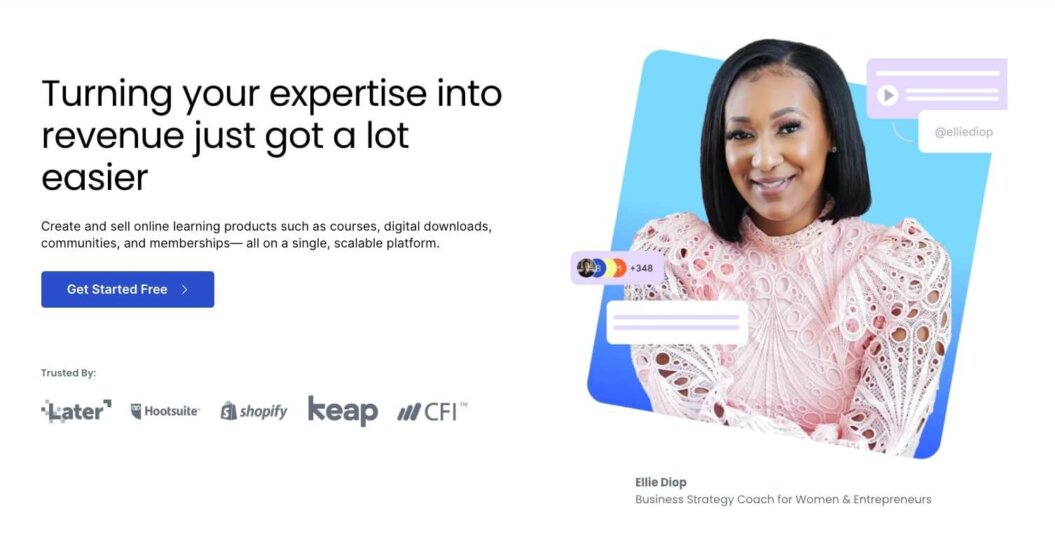
Many debate Thinkific vs Teachable because they are both suited for beginners, but Thinkific has zero transaction fees and a better free plan.
Known as a top-rated online course platform and Learning Management System (LMS), Thinkific offers a wide range of tools for course creators. Thinkific is a great platform for first-time creators, solopreneurs, and business owners on a budget.
Even on your free plan — an addition that makes this Teachable alternative so popular — you get access to a drag and drop course builder, easy to use website templates, and fully functional ecommerce features. A lot more robust than Teachable’s out-of-the-box offering!
Because it’s more affordable with better features (and customer ratings), I genuinely think if you’re a first-time creator looking to cut your teeth, this is a good place to start!
Take a look at some of the successful online course creators here:
What Customers Say
“It’s reliable and does more than it says on the tin. It processes payments really well, including payment plans so for example if we get learners on payment plans but they skip a payment (for whatever reason) the platform puts a hold on their access automatically so we can get in touch and troubleshoot the issue.”
– Higher Education Business., Verified User
“The ability to create an entire online learning environment. The analytics and insight into student behavior are also very valuable. The customer service and support has been really helpful to make sure we’re getting the best out of what Thinkific Plus has to offer.”
– Kat P., Verified User
Thinkific’s Key Features
- Video hosting by Wistia in 4K quality.
- Fully brandable course player.
- Customized website.
- Landing and sales pages with SEO options.
- Different types of payment options.
- Certificates and customizable course completion pages.
- Support for digital downloads.
- Detailed analytic reports.
Thinkific Pros
- ✅ Intuitive design and easy navigation
- ✅ Super generous free plan
- ✅ Responsive customer support
Thinkific Cons
- ❌ Limited built-in marketing tools
- ❌ Basic design templates
- ❌ Limited course compliance tools
Thinkific Pricing
- Free Plan: This plan is for beginners and includes basic features such as one course, one community, unlimited students, and 0% transaction fee.
- Basic Plan: Priced at $36/month, it offers unlimited courses, one community, more spaces per community, and additional features like custom domain and affiliate selling.
- Start Plan: At $74/month, this includes all Basic features plus extras like assignments, memberships, and advanced course-building options.
- Grow Plan: For $149/month, this plan is designed for scaling businesses with features like multiple communities, additional administrators, and advanced analytics.
- Expand Plan: Costing $374/month, offering extensive features for larger operations.
- Plus Plan: This is a custom plan tailored for large enterprises with unique requirements.
3. Mighty Networks
Best for: creating online courses focused on community over content.
G2 Rating: 4.6 out of 5
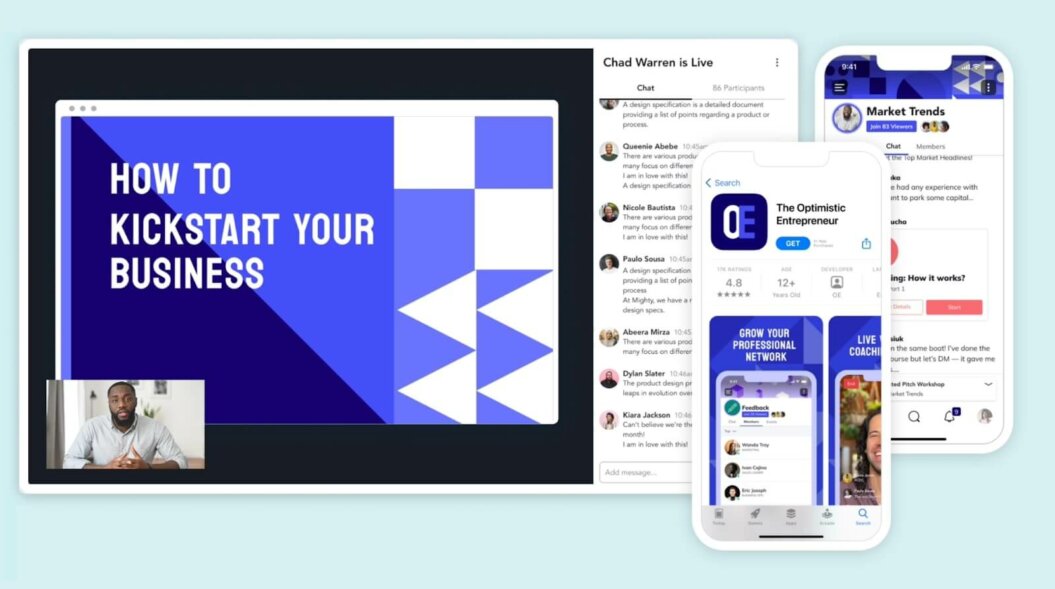
Mighty Networks have begun adapting their product to make it more capable to create online courses while supporting healthy online communities.
If you feel that your course content is only part of what you offer, and you believe in the power of community spaces, then Mighty Networks might be one of the best Teachable alternatives for you.
It’s well suited to education types where community discussion and interaction is just as — if not more important — than the content that sparks the debate. And, their platform theoretically supports unlimited courses.
Though they’re new to the online course space, Mighty Networks, they’ve earned a spot as one of the best online subscription-based learning platforms, because they have been around for a (relatively) long time, and are a trusted name.
This extra time has allowed them to develop a comprehensive suite of tools — one that’s both a selling point and overwhelming for new users. Check out some of their notable educational communities below to find out more:
What Customers Say
“It’s easy to use and a try network. I had another membership site and it was like being on an island. Clunking and not friendly at all! Mighty Networks was like a watershed moment for me. I was like, now they “get me.”
– Pam P., Verified User
“I love that it’s created for community that focus on online learning platforms with the creator also in mind. Have the ability to truly customize exactly what YOU need without all the unnecessary features.”
– Ashley S., Verified User
Mighty Network’s Key Features:
- Personalized activity feed for members
- Create courses with public, private, or paid communities
- Workflow automation with integrations
- Analytics dashboard
- Custom domain and your own website for selling courses
Mighty Network Pros
- ✅ All-in-one platform to help sell online courses
- ✅ Advanced engagement tools like virtual events, group calls, polls, and discussions
- ✅ Mobile accessibility for on-the-go access
- ✅ Unlimited courses
- ✅ Marketing features
Mighty Network Cons
- ❌ Not tailored to online course creation
- ❌ Steep learning curve to master features
- ❌ Support can be slow for non-US based customers
Mighty Network Pricing
Mighty Networks has 4 pricing options:
- Courses: $99 per month. This plan gives you everything you need to build a community with custom branding.
- Business: $179 per month. This plan gives you the tools to scale a community and integrate it with other tech.
- Path-to-Pro: $360 per month. This plan builds on the previous 2, with a goal to prepare you for the Pro plan.
- Mighty Pro: This plan comes with custom pricing and specifications, so you’ll need to speak to a Sales advisor.
4. Podia
Best for: creators that need an all-in-one digital storefront.
G2 rating: 4.6 out of 5
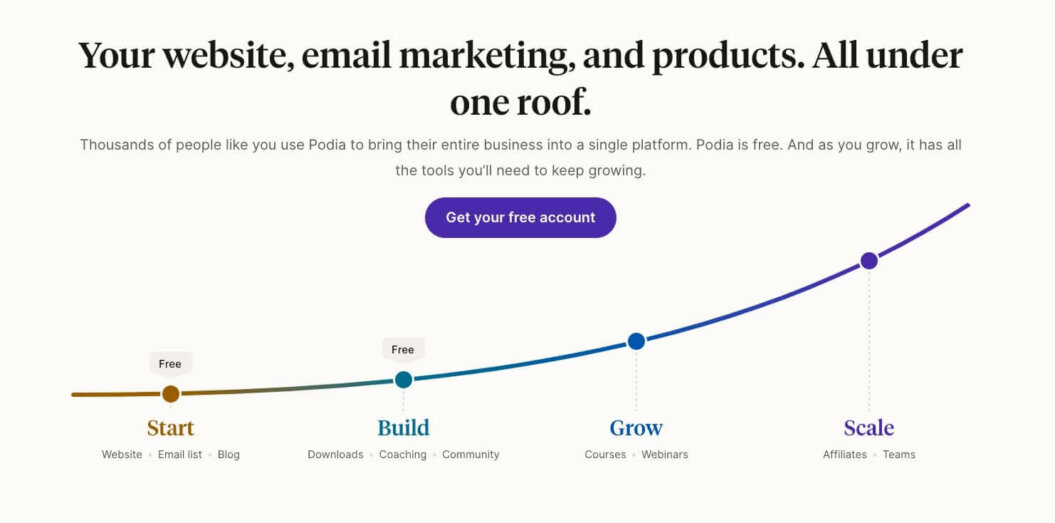
Podia is a membership platform that has both the tools to build your online course and create your membership site. And, if you need to migrate information onto the platform, Podia allows you to do so for free.
Podia offers a simple UX and low learning curve. You can get up and running pretty fast and cover all your bases, as well as offer a wide range of products, like:
- Memberships
- Digital downloads
- Coaching packages
- Traditional courses
In my experience, Podia stands out for selling one-off digital downloads, which can be great if you’re looking to sell a one-and-done course from your own branded website.
You get a lot of bang for your buck, even in the basic plan, which allows you to build your own custom website, get email marketing features, and implement community building features. You can create topics, sub-forums, groups, and a free community section. You can also chat directly with students via chat window, video, or comments.
However…it’s hard to know what Podia really is. It’s not a true course builder (even though it has features), it’s not a true membership platform (even though it has those features too), and it’s not quite a marketing suite (even though it offers all of those features).
I feel like Podia is a great option if you’re not really sure what you want, and you want access to lots of potential features to build the first version of your platform, before you migrate elsewhere. But, these additional features do come at a premium outside of their base pricing. This can mean Podia gets pricey, quickly.
You can view some of their success stories below:
What Customers Say
With Podia, everything you and your clients need is in one place. No more hopping between sites or sifting through disorganized Facebook groups. My current and potential clients can find everything they need on my Podia site. I can update my website, interact with my community, add new products, track email campaigns, and view audience activity—all from a single platform.
– Michelle J., Verified User
“I am definitely no professional at figuring out how to navigate online platforms. I found the Podia site pretty easy to navigate, and not only is their help menu super helpful, but hands down, they have the most wonderful support staff who respond to any questions you have that you haven’t been able to figure out.
– Mary P., Verified User
Podia’s Key Features:
- One-step sign-up process.
- Easy course creation with a dedicated page for content, settings, and pricing.
- Ability to sell a variety of digital products, including courses, webinars, and bundles.
- Live demo and creator Q&A webinar for platform navigation.
- Options for email marketing, e-commerce functionality, and live chat.
Podia Pros:
- ✅ Instant payouts through Stripe or PayPal
- ✅ Easy to navigate for creators
- ✅ Affordable entry-level plan
Podia Cons:
- ❌ Limited membership features
- ❌ Limited free plan with high transaction fees
- ❌ Lacks email personalization
Podia Pricing:
- Free Plan: $0/month with 10% transaction fees. Includes basic features like a full website, community, and limited product offerings.
- Starter Plan: $9/month billed monthly or $4/month billed yearly. Transaction fees are 8%. Offers a full website, community, and basic product offerings.
- Mover Plan: $39/month billed monthly or $33/month billed yearly. This plan has 5% transaction fees and includes unlimited downloads, courses, coaching products, and more.
- Shaker Plan: $89/month for the first year, then $75/month billed monthly or $59/month billed yearly. This plan has no transaction fees and includes advanced marketing features.
Optional email and team add-ons are available for all plans.
5. Kajabi
Best for: seasoned infopreneurs.
G2 Rating: 4.3 out of 5

The Kajabi vs Teachable debate is common and there are multiple Kajabi alternatives out there. Overall, Kajabi is built for more tech savvy, business solopreneurs that need everything in one place. On the other hand, Teachable is better for beginner course creators that require simple building tools.
Kajabi is an all-in-one platform to plan, create, market, and sell courses. It literally has everything you can think of in one place — landing pages, marketing funnels, podcasts, courses templates, community and coaching features. With native web hosting and blogs, you don’t need to build with a bunch of different software, just Kajabi.
Kajabi is ideal for new entrepreneurs. Everything you need to manage your online business is one click away. And since the brand knows you wear all the hats, it even makes all your marketing simple with templates upon templates.
Although Kajabi pricing is more expensive than Teachable (the basic plan starts at $149 per month), it lowers the amount of money you spend on other software for email, webinars, and coaching. So, despite the high sticker price, you can actually save money because you don’t need to spend on all these other platforms.
You can take a look at some of their successful online course businesses here:
What Customers Say
“Easy to implement all in one platform for courses, website, email, shopping cart, and way more. It has tagging, email sequences, quizzes, podcasts, blog, video hosting, and incredible flexibility. The end result is beautiful and fast. Customer support is responsive.”
– Anastasia C, Verified User
“One stop shop. Setting up was super easy and it has a ton of solutions to let you manage everything in your work in one place. The builder is quite easy and the campaign builder is especially powerful.”
– Gabriel C., Verified User
Kajabi’s Key Features:
- 24/7 live chat
- Course creation
- Website builder
- Landing pages
- Email marketing
- Membership sites
- Payment processing
- Analytics and reporting
- Mobile app
- Marketing automation
Kajabi Pros:
- ✅ Everything in one place
- ✅ Saves time and money
- ✅ Helps you scale faster
- ✅ High-conversion templates
- ✅ Thriving community of creators
- ✅ Multiple products available to sell
Kajabi Cons:
- ❌ Not intuitive for beginners
- ❌ No live-streaming capabilities
- ❌ Custom code required to create a unique looking website
- ❌ No easy content export, with limited file history
Kajabi Pricing:
- Basic Plan: $149/month, or $119/month if billed annually.
- Growth Plan: $199/month, or $159/month if billed annually. A promotional offer includes the first 3 months for $99.
- Pro Plan: $399/month, or $319/month if billed annually.
How does Uscreen compare to Kajabi?

6. LearnDash
Best for: building courses on WordPress websites.
G2 rating: 4.2 out of 5
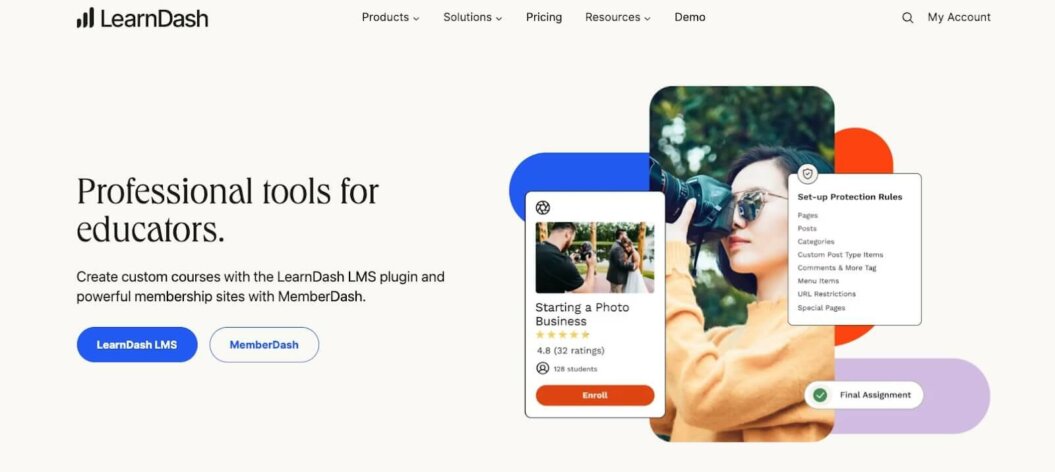
If you’re a text-based course creator with an existing WordPress website, then LearnDash might be the Teachable alternative for you.
LearnDash provides a comprehensive learning management system (LMS) that integrates seamlessly with your site, allowing you to build comprehensive courses with their drag-and-drop builders.
You can add lessons and modules and organize them easily, which creates easy content management for premium text-driven courses.
You can drip-release content over time and keep your students engaged with quizzes and assignments. Better still, you can manually grade and provide feedback to enhance the learning experience.
LearnDash really excels in providing scalability for your business. Their plugin can cope with a high volume of students, with superb user management, and even allows you to group them to get accurate data from key demographics or learner types.
What Customers Say
I’ve built a couple of websites with LearnDash now, and I’ve got to say that customer support is one of my favorite features. As for LearnDash itself, the platform is incredibly easy to use. It is also a plugin and not a theme; which is great because themes are generally more of a pain to customize and will often conflict with other plugins.
– Legal Services Educator, Verified User
LearnDash is a power-packed LMS plugin that caters to all types of LMS requirements. It is a very user-friendly, lightweight and robust system that provides a seamless end-user experience in online learning.
– Nikhil S., Verified User
LearnDash Key Features:
- Drag-and-drop course builder
- Advanced quizzes
- Manually graded assignments
- Dynamic forums
- Certificates and badges
- Impressive user management
Pros of LearnDash
- ✅ Purpose-built for educational content
- ✅ User-friendly interface
- ✅ Scalable to large volumes of students
Cons of LearnDash
- ❌ Complex setup process
- ❌ Extra integrations can cost $$$
- ❌ User experience design feels outdated
LearnDash Pricing
- $199/year for 1 site
- $399/year for up to 10 sites
- $799/year for unlimited sites
7. Skillshare
Best for: teaching creative skills.
G2 rating: 3.3 out of 5
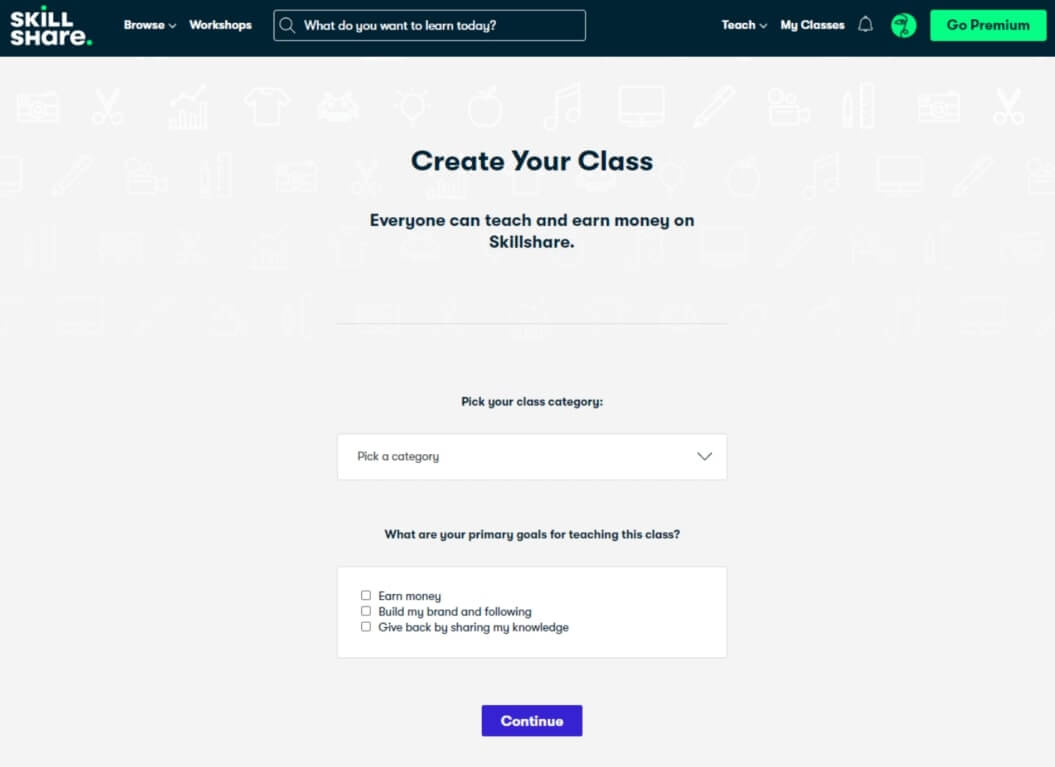
Skillshare is a course creation platform similar to Udemy, but they put their own spin on it. Rather than Skillshare users paying for each course they want to take, they pay a monthly fee and get access to all of the platform’s classes. You can find any type of course on Skillshare, spanning topics like illustration, design, photography, video, freelancing, and more. You can also reach a huge student base of 12 million.
The main difference between Skillshare and Teachable is focus. Teachable is more for entrepreneurs and businesses that want to sell their own courses, offering a suite of tools for course creation, marketing, and sales. Skillshare is geared more towards lifestyle and creative education. Members that sign up to Skillshare can take classes from various instructors, and can even get their own opportunity to teach!
Skillshare earnings are based on course engagement and referral links. It’s a little unpredictable and depends on course views and student reviews. Teachers are paid from a pooled fund, but you can get bonuses if you become a top-rated instructor. With Teachable, you set your own course prices and earnings depending on how many sales you make.
If you want to create a Skillshare course, know that it’s best for shorter, more concise classes or tutorials. While there are longer courses available, the majority sit between 10 and 20 minutes, give or take. Teachable has features like quizzes, drip content, and course completion certificates, which are more suitable for longer, detailed programs.
You can become an instructor for Skillshare on one condition: your courses should be skills-based. Who’d have thought, right?
Skillshare’s Features:
- Teacher Help Center for tips on making your class
- Mobile-friendly course delivery
- Flexibility in course length and format
- Opportunity to run month-long workshops
- Team plans facilitating group learning
- Access to a teacher handbook for guidance
- An online portal to address queries
- Video editing tools to add captions and cover images
Skillshare Pros:
- ✅ Wide reach through a large catalog
- ✅ Ease of course delivery through apps
- ✅ Flexibility in course creation
- ✅ Potential for deeper student engagement via workshops
Skillshare Cons:
- ❌ Limited direct support options
- ❌ Sales approach might feel pushy
- ❌ Short free trial period could limit student sign-ups
Pricing
This Teachable competitor is free to publish classes on, so long as they meet Skillshare’s guidelines. You’ll make money based on the number of minutes users watched your classes that month. You can also get a referral bonus by referring students who sign up to the platform.
8. Udemy
Best for: creators with no audience.
G2 rating: 1.9 out of 5
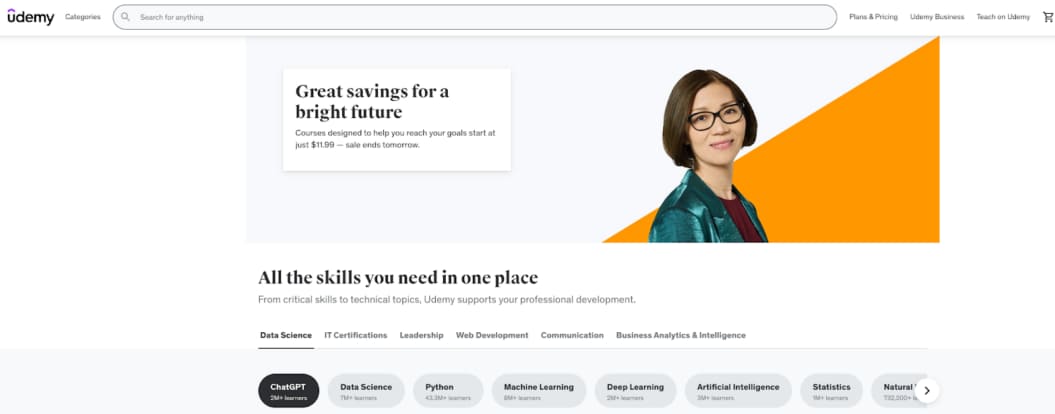
Udemy is a powerful online education platform that serves as a global marketplace for learning and instruction. It boasts a catalog of over 213,000 courses and a user base of more than 59 million learners.
It differs from other platforms in this list by being a marketplace that lets educators sell courses under the Udemy brand. It has become a popular Teachable alternative because it has less restrictions concerning the video, text and audio content instructors are able to create.
Udemy is primarily a marketplace where anyone can either learn new skills or improve existing ones, compared to an online course software like Teachable. Students come to Udemy looking for a specific course to take, and will read reviews to determine the best options.
With marketplaces like Udemy, you don’t get full control over your branding. But you do get a built-in audience and potential to be featured in Udemy ads. However, there are limitations placed on the amount you can charge for your courses.
Udemy Features:
- Reach a global audience of over 59 million learners
- Ability to offer courses in various categories and subcategories
- Handles payment processing and customer service
- Offer both free and paid courses
- Udemy for Business allows corporate training opportunities
Udemy Pros:
- ✅ Access to a big, global student base
- ✅ Well established course builder
- ✅ Control over course content, pricing, and updates
- ✅ Potential to be featured in Udemy marketing efforts
Udemy Cons:
- ❌ With over 200,000 courses, standing out is tough
- ❌ Udemy takes a portion of course sales
- ❌ Limited options to interact with students
- ❌ No marketing and sales tools
Udemy Pricing
Udemy is free for instructors and uses a revenue sharing model. In other words, their pricing is a little out of the ordinary. If somebody purchases your course with a referral link or coupon, you will receive 97% of the revenue.
If the sale happens organically, you will receive 37% of the revenue from the sale. So if your personal marketing is strong, you stand to make high earnings. If you plan to rely on Udemy’s traffic, you might see underwhelming returns.
Wrapping This Up…
Whether you intend to launch your first course or expand your operations, you should team up with a platform that can scale with you. That’s why it’s great we live in a world with so many options.
The Teachable alternatives we’ve explored in this post have something for everyone. And if our offerings at Uscreen sound like what you’re looking for, click below to start a free trial:
Build, launch and manage your membership, all in one place.
Teachable Alternatives FAQs
Teachable is an educational platform for teachers and course creators to host their instructional videos and get paid for their work. The platform was created almost a decade ago in response to the shortcomings its founder experienced using another online course platform.
Now, more than 100,000 instructors have launched courses on Teachable. They cover topics ranging from wine pairing to freediving and can offer their services through coaching sites and workshops.
Content creators choose Teachable because it lets them:
Start using the platform for free.
Quickly build and launch their online courses.
Offer course bundling and subscription fee management.
Ensure students meet set requirements for compliance.
Provide students with certificates of completion.
AI-assisted course creation.
Teachable offers 5 plans to its users:
Free: their free plan allows for unlimited students, unlimited courses, and coaching services. You’ll get to bundle your products and quiz students. The free plan does include a $1+10% fee on each transaction.
Basic: their next plan allows you to drip-feed content, create a members-only community, and create coupon codes. The price is $39 per month plus 5% per transaction.
Pro: this plan gives you an unbranded website, affiliate marketing, and advanced reports on students. The price is $119 per month.
Pro +: their next plan includes everything from Free to Pro, plus more digital products to sell and custom user roles. The price is $199 per month.
Business: their top tier opens up bulk student enrollment, manual student imports, unlimited products, and advanced customization. You’re paying $499 per month for this plan.
Teachable does take a percentage of sales, but the amount depends on your plan. For example, with the free plan, Teach has a $1 + 10% fee for every sale. On the basic plan ($39 per month), Teachable charges a flat 5% transaction fee for each sale.







